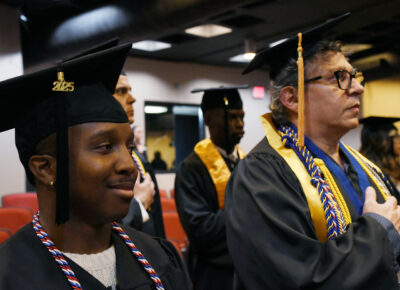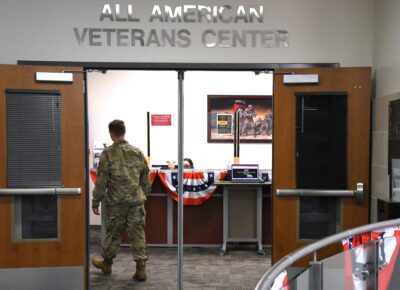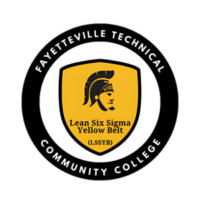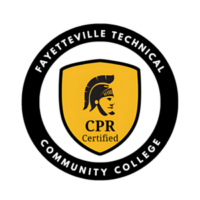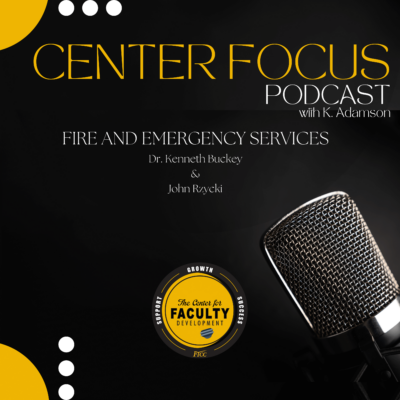
FTCC student Whitney Carter began an apprenticeship with RAYWEST DESIGNBUILD in June 2023. [Contributed photo]
FTCC is on a mission to prepare students to enter the workforce, gaining employment in careers that utilize their skills and knowledge.
Some students can even get a headstart in the workforce before they finish school through Apprenticeship NC, the N.C. Community Colleges System’s registered apprenticeship program .
Through the program, local employers hire students to be paid employees while being formally trained on the job. The resulting relationship is mutually beneficial, with employees gaining valuable on-the-job learning and the employers strengthening their ready-to-work pipeline.
To qualify as a registered apprenticeship, the opportunity must include on-the-job training and related instruction in the classroom, and it must last a minimum of one year or 2,000 hours.
Nore Brantley is FTCC’s Coordinator of Apprenticeships. She said that despite the specific requirements of a registered apprenticeship, the term is often used interchangeably with terms like “internship,” which is a shorter training stint, or “work-based learning,” which has a different set of requirements.
The length of apprenticeships allows apprentices to be paid on a progressive wage scale, reduces operational costs and encourages promotion of existing employees.
Brantley said companies are experiencing what she refers to as the “gray tsunami” — a wave of skilled, experienced workers reaching retirement age and exiting the workforce.
“Registered apprenticeships are industry-driven,” Brantley said. “Companies, especially in the industry, are having a hard time finding workers. Apprenticeships, to me, are just another opportunity to find workers.”
Local design and construction company RAYWEST DESIGNBUILD became an employer partner this summer, hiring FTCC student Whitney Carter as a Project Coordinator Apprentice in June. Kim Barefoot, RAYWEST DESIGNBUILD’s office manager, said the company was thrilled to join the partnership.
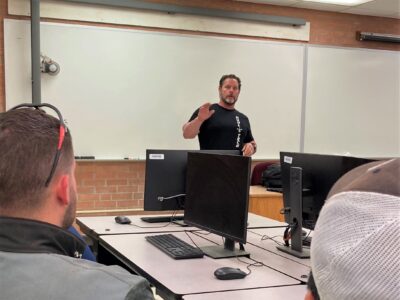
Ruhl, Inc., own Andrew Ruhland speaks to a welding class about apprenticeship opportunities. [FTCC photo]
“Not only does this program make a huge impact on the life of the student, it also allows us to leave our mark as a company as we invest in our future workforce,” Barefoot said.
While apprenticeships are often associated with the skilled trades, over 1,300 occupations qualify for apprenticeships, including education, healthcare, IT and office and administrative support.
Andrew Ruhland owns Ruhl, Inc., a local company that manufactures breach entry tools. He recently connected with FTCC in search of apprentices.
He needed not only an apprentice welder but also a marketing apprentice to help meet the company’s social media needs.
“I need people who can fabricate, and I need people who can weld,” Ruhland said when he spoke to a welding class in the spring. “What I’m after is your talent. With your talent, we can grow even bigger.”
There are currently two incentive programs for businesses of varying sizes looking to partner with Apprenticeship NC to find apprentices who can meet different types of needs.
With funding and incentives available, Brantley said now is the time for employers looking for solutions to worker shortages to jump into apprenticeships.
“What companies have been doing to recruit workers isn’t working because they have unfilled positions,” Brantley said. “This might be a long-term solution to find workers who have some skills and can start work right away.”
For more information about apprenticeships at FTCC or how your business can join this program, contact Nore Brantley at brantlen@faytechcc.edu or 910-678-0089.



